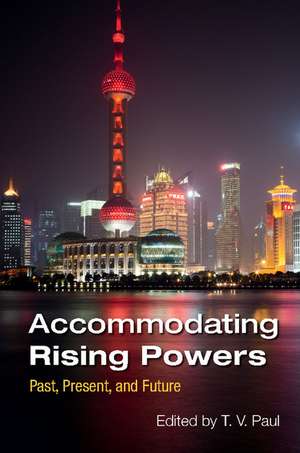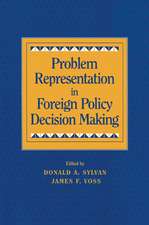Accommodating Rising Powers: Past, Present, and Future
Editat de T. V. Paulen Limba Engleză Paperback – 6 mar 2016
| Toate formatele și edițiile | Preț | Express |
|---|---|---|
| Paperback (1) | 263.97 lei 43-57 zile | |
| Cambridge University Press – 6 mar 2016 | 263.97 lei 43-57 zile | |
| Hardback (1) | 721.85 lei 43-57 zile | |
| Cambridge University Press – 9 mar 2016 | 721.85 lei 43-57 zile |
Preț: 263.97 lei
Nou
Puncte Express: 396
Preț estimativ în valută:
50.52€ • 52.42$ • 42.22£
50.52€ • 52.42$ • 42.22£
Carte tipărită la comandă
Livrare economică 17-31 martie
Preluare comenzi: 021 569.72.76
Specificații
ISBN-13: 9781107592230
ISBN-10: 1107592232
Pagini: 335
Ilustrații: 3 b/w illus.
Dimensiuni: 153 x 232 x 18 mm
Greutate: 0.46 kg
Editura: Cambridge University Press
Colecția Cambridge University Press
Locul publicării:New York, United States
ISBN-10: 1107592232
Pagini: 335
Ilustrații: 3 b/w illus.
Dimensiuni: 153 x 232 x 18 mm
Greutate: 0.46 kg
Editura: Cambridge University Press
Colecția Cambridge University Press
Locul publicării:New York, United States
Cuprins
Part I. Mechanisms of Accommodation: 1. The accommodation of rising powers in world politics T. V. Paul; 2. Realism, balance of power, and power transitions Steven E. Lobell; 3. Globalization, interdependence, and major power accommodation Philip Potter; 4. What would E. H. Carr say? How international institutions address peaceful political change Krzysztof J. Pelc; 5. The responsibility to accommodate: ideas and change Mlada Bukovansky; Part II. Historical Cases: 6. Seizing the day or passing the baton? Power, illusion, and the British Empire Ali Zeren and John A. Hall; 7. The US accommodation of communist China Lorenz M. Lüthi; 8. Accommodation and containment: Great Britain and Germany prior to the two world wars Martin Claar and Norrin M. Ripsman; 9. Did the US and the Allies fail to accommodate Japan in the 1920s and the 1930s? Jeffrey W. Taliaferro; Part III. Contemporary Cases: 10. China's bargaining strategies for a peaceful accommodation after the Cold War Kai He; 11. Partial accommodation without conflict: India as a rising link power Aseema Sinha; 12. Brazil: revising the status quo with soft power? David R. Mares; 13. Prospects for the accommodation of a resurgent Russia Nicola Contessi; Part IV. Conclusions: 14. Great power accommodation and the processes of international politics Theodore McLauchlin.
Recenzii
'This volume takes on an important and timely topic: how should the world manage interstate power shifts in the interest of keeping peace and stability? The contributing authors study both past and current encounters between established and rising powers. They offer valuable insights for scholars and officials alike.' Steve Chan, College Professor of Distinction, University of Colorado, Boulder
'In a moment of transition and change, this timely collection takes stock of what theory and history tell us about peaceful and violent power transitions. Sensitive to the distinctive conditions of contemporary world politics and relying on first-rate essays by his distinguished colleagues, T. V. Paul comes down sensibly on both sides of Hegel - this owl of Minerva also flies in the twilight.' Peter J. Katzenstein, Walter S. Carpenter Jr, Professor of International Studies, Cornell University, New York
'T. V. Paul and his co-authors re-examine the conditions for peaceful international change in this sweeping set of theoretical and empirical studies. Including historical as well as contemporary cases, Accommodating Rising Powers illuminates the successful and unsuccessful strategies pursued by rising and incumbent powers as they bargain over the future global order.' Miles Kahler, Distinguished Professor, School of International Service, American University and Senior Fellow for Global Governance, Council on Foreign Relations
'Perceptions of global power shifts have an immediacy that few other international relations issues have, because rising powers have historically posed a threat to international stability and a risk of conflict and war. They also challenge international theorists. The 14-essay volume edited by Paul addresses the challenge in terms of policies that could accommodate rising powers … The essays are very well footnoted. [This] book is strongly recommended for university students and scholars.' R. P. Peters, Choice
'In his impressive collection, Paul leads an interdisciplinary group of scholars in exploring how rising powers and more established rivals have dealt with this dilemma in the past. The book makes clear that long-term shifts in power among states do foment insecurity and conflict, but diplomacy and steady strategies of reciprocity and self-restraint can bring countries back from the brink of war.' G. John Ikenberry, Foreign Affairs
'This is, then, a thought-provoking book that addresses theoretical and practical problems of pressing concern. It fits with the general movement in the study of International Relations away from structural theories and towards mid-range theorising about diplomatic practice. As such, it is a welcome and important volume.' Ian Hall, International Affairs
'Accommodating Rising Powers is a worthy read that is one of the best, if not the only elaboration on the concept of accommodation in IR.' Hakan Mehmetcik, E-International Relations (www.e-ir.info)
'In a moment of transition and change, this timely collection takes stock of what theory and history tell us about peaceful and violent power transitions. Sensitive to the distinctive conditions of contemporary world politics and relying on first-rate essays by his distinguished colleagues, T. V. Paul comes down sensibly on both sides of Hegel - this owl of Minerva also flies in the twilight.' Peter J. Katzenstein, Walter S. Carpenter Jr, Professor of International Studies, Cornell University, New York
'T. V. Paul and his co-authors re-examine the conditions for peaceful international change in this sweeping set of theoretical and empirical studies. Including historical as well as contemporary cases, Accommodating Rising Powers illuminates the successful and unsuccessful strategies pursued by rising and incumbent powers as they bargain over the future global order.' Miles Kahler, Distinguished Professor, School of International Service, American University and Senior Fellow for Global Governance, Council on Foreign Relations
'Perceptions of global power shifts have an immediacy that few other international relations issues have, because rising powers have historically posed a threat to international stability and a risk of conflict and war. They also challenge international theorists. The 14-essay volume edited by Paul addresses the challenge in terms of policies that could accommodate rising powers … The essays are very well footnoted. [This] book is strongly recommended for university students and scholars.' R. P. Peters, Choice
'In his impressive collection, Paul leads an interdisciplinary group of scholars in exploring how rising powers and more established rivals have dealt with this dilemma in the past. The book makes clear that long-term shifts in power among states do foment insecurity and conflict, but diplomacy and steady strategies of reciprocity and self-restraint can bring countries back from the brink of war.' G. John Ikenberry, Foreign Affairs
'This is, then, a thought-provoking book that addresses theoretical and practical problems of pressing concern. It fits with the general movement in the study of International Relations away from structural theories and towards mid-range theorising about diplomatic practice. As such, it is a welcome and important volume.' Ian Hall, International Affairs
'Accommodating Rising Powers is a worthy read that is one of the best, if not the only elaboration on the concept of accommodation in IR.' Hakan Mehmetcik, E-International Relations (www.e-ir.info)
Descriere
Addresses how to accommodate and integrate rising powers peacefully into the international order in the nuclear and globalized age.


















